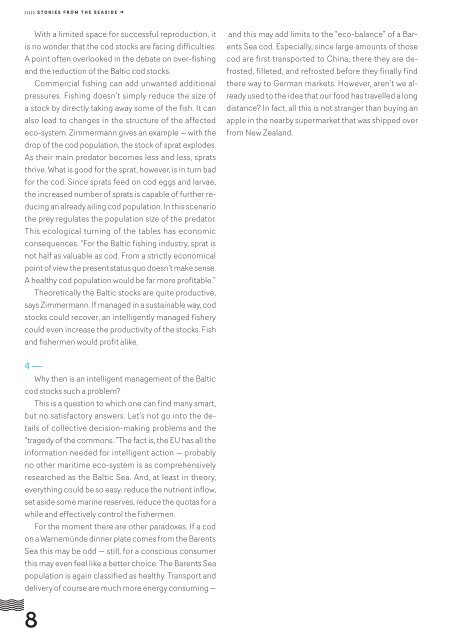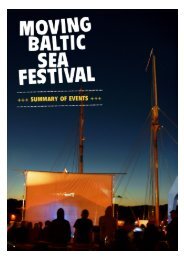the plotki magazine (pdf) - Moving Baltic Sea
the plotki magazine (pdf) - Moving Baltic Sea
the plotki magazine (pdf) - Moving Baltic Sea
Create successful ePaper yourself
Turn your PDF publications into a flip-book with our unique Google optimized e-Paper software.
S T O R I E S F R O M T H E S E A S I D E →With a limited space for successful reproduction, itis no wonder that <strong>the</strong> cod stocks are facing difficulties.A point often overlooked in <strong>the</strong> debate on over-fishingand <strong>the</strong> reduction of <strong>the</strong> <strong>Baltic</strong> cod stocks.Commercial fishing can add unwanted additionalpressures. Fishing doesn’t simply reduce <strong>the</strong> size ofa stock by directly taking away some of <strong>the</strong> fish. It canalso lead to changes in <strong>the</strong> structure of <strong>the</strong> affectedeco-system. Zimmermann gives an example with <strong>the</strong>drop of <strong>the</strong> cod population, <strong>the</strong> stock of sprat explodes.As <strong>the</strong>ir main predator becomes less and less, spratsthrive. What is good for <strong>the</strong> sprat, however, is in turn badfor <strong>the</strong> cod. Since sprats feed on cod eggs and larvae,<strong>the</strong> increased number of sprats is capable of fur<strong>the</strong>r reducingan already ailing cod population. In this scenario<strong>the</strong> prey regulates <strong>the</strong> population size of <strong>the</strong> predator.This ecological turning of <strong>the</strong> tables has economicconsequences. “For <strong>the</strong> <strong>Baltic</strong> fishing industry, sprat isnot half as valuable as cod. From a strictly economicalpoint of view <strong>the</strong> present status quo doesn’t make sense.A healthy cod population would be far more profitable.”Theoretically <strong>the</strong> <strong>Baltic</strong> stocks are quite productive,says Zimmermann. If managed in a sustainable way, codstocks could recover; an intelligently managed fisherycould even increase <strong>the</strong> productivity of <strong>the</strong> stocks. Fishand fishermen would profit alike.and this may add limits to <strong>the</strong> “eco-balance” of a Barents<strong>Sea</strong> cod. Especially, since large amounts of thosecod are first transported to China; <strong>the</strong>re <strong>the</strong>y are defrosted,filleted, and refrosted before <strong>the</strong>y finally find<strong>the</strong>re way to German markets. However, aren’t we alreadyused to <strong>the</strong> idea that our food has travelled a longdistance? In fact, all this is not stranger than buying anapple in <strong>the</strong> nearby supermarket that was shipped overfrom New Zealand.4 ―Why <strong>the</strong>n is an intelligent management of <strong>the</strong> <strong>Baltic</strong>cod stocks such a problem?This is a question to which one can find many smart,but no satisfactory answers. Let’s not go into <strong>the</strong> detailsof collective decision-making problems and <strong>the</strong>“tragedy of <strong>the</strong> commons. ”The fact is, <strong>the</strong> EU has all <strong>the</strong>information needed for intelligent action probablyno o<strong>the</strong>r maritime eco-system is as comprehensivelyresearched as <strong>the</strong> <strong>Baltic</strong> <strong>Sea</strong>. And, at least in <strong>the</strong>ory,everything could be so easy: reduce <strong>the</strong> nutrient inflow,set aside some marine reserves, reduce <strong>the</strong> quotas for awhile and effectively control <strong>the</strong> fishermen.For <strong>the</strong> moment <strong>the</strong>re are o<strong>the</strong>r paradoxes. If a codon a Warnemünde dinner plate comes from <strong>the</strong> Barents<strong>Sea</strong> this may be odd still, for a conscious consumerthis may even feel like a better choice. The Barents <strong>Sea</strong>population is again classified as healthy. Transport anddelivery of course are much more energy consuming 8



